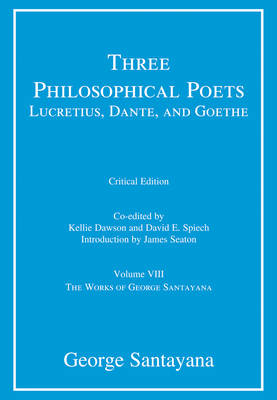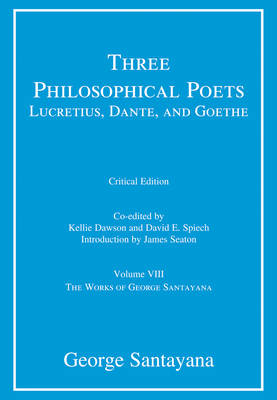
Wil je zeker zijn dat je cadeautjes op tijd onder de kerstboom liggen? Onze winkels ontvangen jou met open armen. Nu met extra openingsuren op zondag!
- Afhalen na 1 uur in een winkel met voorraad
- Gratis thuislevering in België vanaf € 30
- Ruim aanbod met 7 miljoen producten
Wil je zeker zijn dat je cadeautjes op tijd onder de kerstboom liggen? Onze winkels ontvangen jou met open armen. Nu met extra openingsuren op zondag!
- Afhalen na 1 uur in een winkel met voorraad
- Gratis thuislevering in België vanaf € 30
- Ruim aanbod met 7 miljoen producten
Zoeken
Three Philosophical Poets
Lucretius, Dante, and Goethe, critical edition, Volume 8: Volume VIII
George Santayana
€ 127,45
+ 254 punten
Uitvoering
Omschrijving
Santayana's argument for the unity of philosophy and poetry. This concise and compelling volume--described by Santayana as a "piece of literary criticism, together with a first broad lesson in the history of philosophy"--introduces Santayana's thought in the rich context of a European poetic tradition that demonstrates his broad conception of philosophy. Rejecting both the Platonic opposition of philosophy and poetry and more recent attempts to reduce philosophy to science, Santayana argues that philosophy and poetry at their best are united in articulating a comprehensive vision of the world that permits honest contemplation of the universe. He considers the ideal visions of three artists: Lucretius's naturalism provides a total perspective on the physical world but renders experience monotonous; Dante's supernaturalism provides a total perspective on experience but subordinates nature to morality; Goethe's romanticism provides a dramatic perspective on nature and experience but lacks totality. Santayana sees each as the best in his own way, though none is best in all ways; and he speculates that the ideal poet would integrate the gifts and insights of all three, resulting in "rational art," of which philosophical poetry is a prime example. This critical edition, volume VIII of The Works of George Santayana, includes notes, textual commentary, lists of variants and emendations, an index, and other tools useful to Santayana scholars.
Specificaties
Betrokkenen
- Auteur(s):
- Uitgeverij:
Inhoud
- Aantal bladzijden:
- 280
- Taal:
- Engels
- Reeks:
Eigenschappen
- Productcode (EAN):
- 9780262551823
- Verschijningsdatum:
- 9/04/2024
- Uitvoering:
- Paperback
- Formaat:
- Trade paperback (VS)
- Afmetingen:
- 152 mm x 229 mm
- Gewicht:
- 408 g

Alleen bij Standaard Boekhandel
+ 254 punten op je klantenkaart van Standaard Boekhandel
Beoordelingen
We publiceren alleen reviews die voldoen aan de voorwaarden voor reviews. Bekijk onze voorwaarden voor reviews.











